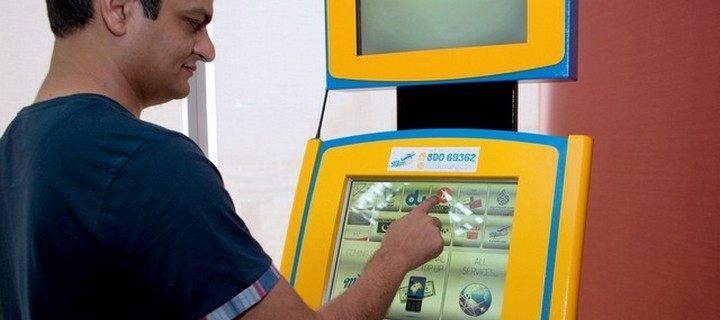Dubai’s first Bitcoin ATM opens up currency debate
Employees at the FMW/ManGo offices in Dubai Media City demonstrate the new payment kiosk machine which also accepts Bitcoin. This is the first Bitcoin enabled machine in the UAE.

The country’s first Bitcoin ATM has been activated as enthusiasts for the virtual currency rally to promote its wider use in the relatively untapped Middle East market.
Located in an office in Dubai Media City, the kiosk allows people to deposit cash into their Bitcoin wallet (the name for their virtual account).
Umbrellab, the start-up that is developing the technology, aims to integrate the technology into 300 existing electronic service kiosks it already operates in shopping malls, supermarkets, hotels and labour camps across the UAE. Another 100 kiosks stored in a warehouse will also be activated. Each individual will be limited to the equivalent of up to Dh2,000 of Bitcoin transactions per day and Dh10,000 per month.
"People are welcome to come and give the ATM a go," said Sergey Yusupov, the co-founder of Umbrellab. "We are seeing how everything goes from a legal perspective with the first ATM, as well as making sure it is stable before rolling them out."
The launch comes as believers in Bitcoin push for its broader adoption in the region. Launched in 2009, Bitcoin is a global online payment network that minimises the need to exchange money between international currencies.
Although the Middle East is one of the least integrated region’s into the global Bitcoin network, advocates for the virtual currency say it is fertile ground because of its large, youthful population and high proportion of migrant labour.
Bitcoin has the potential to enable migrants to transfer money home at cheaper rates than those offered by conventional exchange houses, supporters say.
Some of those gathered in Dubai on Monday and Tuesday evening to explain about the growth potential in the region.
"Why is it important for the Middle East?" said Ola Doudin, an entrepreneur with bases in Amman and Dubai. "First, there are around 60 to 70 per cent of adults across the Middle East that don’t have access to any banking services. They can’t transact and are stuck in a cash economy. With Bitcoin you’re eliminating that – all you need is access to the internet or mobile phone with access to the Bitcoin network."
Critics point to the recent scandals that have dealt a blow to Bitcoin’s credibility internationally. The most high-profile controversy related to the collapse earlier this year of Mt Gox, a virtual-currency exchange, after the disappearance of about US$340 million in Bitcoins.
There is also the often frosty response to Bitcoin by financial regulators. In December, the People’s Bank of China banned financial institutions from trading in Bitcoin, vowing to clamp down on money laundering risks related to the virtual currency.
In the region, regulators have been largely silent so far on how they plan to respond to the increasing use of Bitcoin. Umbrellab has had no communication to date with the Central Bank about the regulation of its Bitcoin ATM. Nobody was available to comment from the bank yesterday.
"The reaction we are seeing around the world to Bitcoin is about the protection of consumers. They are concerned about existing problems and existing sets of regulation," Juan Llanos, a US-based risk compliance adviser, said at the Bitcoin talk on Tuesday.
